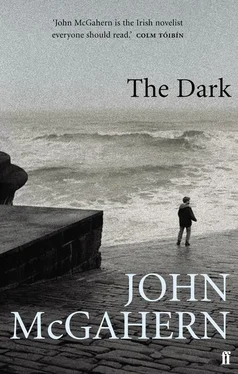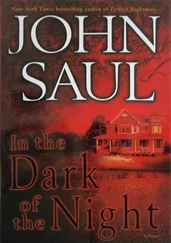John McGahern - The Dark
Здесь есть возможность читать онлайн «John McGahern - The Dark» весь текст электронной книги совершенно бесплатно (целиком полную версию без сокращений). В некоторых случаях можно слушать аудио, скачать через торрент в формате fb2 и присутствует краткое содержание. Год выпуска: 2002, Издательство: Penguin Books, Жанр: Современная проза, на английском языке. Описание произведения, (предисловие) а так же отзывы посетителей доступны на портале библиотеки ЛибКат.
- Название:The Dark
- Автор:
- Издательство:Penguin Books
- Жанр:
- Год:2002
- ISBN:нет данных
- Рейтинг книги:5 / 5. Голосов: 1
-
Избранное:Добавить в избранное
- Отзывы:
-
Ваша оценка:
- 100
- 1
- 2
- 3
- 4
- 5
The Dark: краткое содержание, описание и аннотация
Предлагаем к чтению аннотацию, описание, краткое содержание или предисловие (зависит от того, что написал сам автор книги «The Dark»). Если вы не нашли необходимую информацию о книге — напишите в комментариях, мы постараемся отыскать её.
The Dark — читать онлайн бесплатно полную книгу (весь текст) целиком
Ниже представлен текст книги, разбитый по страницам. Система сохранения места последней прочитанной страницы, позволяет с удобством читать онлайн бесплатно книгу «The Dark», без необходимости каждый раз заново искать на чём Вы остановились. Поставьте закладку, и сможете в любой момент перейти на страницу, на которой закончили чтение.
Интервал:
Закладка:
The shops were closing, a grey gentleness entering the light, and the blinds of the pubs were down. People who had no status to uphold were coming out to sit on the bridge. Girls with an air of secrecy about them were going somewhere dressed for the evening. Young men with oil plastering down their hair had come in from the country and stood at the corners with bicycle-clips in their trousers. Girls were sure to pass. Someone might get drunk and make a fool of himself. There might be even a fight or car crash.
“It was a cost but we had to do it. We had to celebrate it. And it’s one you’ll remember no matter how high you go in the world.”
He had to look solemn but he felt free after the hotel and wanted to laugh. He watched his father cycle by his side home, the head low into the wind over the dynamo lamp, pushing. He waited for him to pass the graveyard.
“It gives me the creeps, that place! No matter what happens it winds up there. And you wouldn’t mind only there’s people dying to get into it,” everybody repeated themselves but suddenly at the old joke he wanted to laugh with him and say,
“You are marvellous, my father.”
27
IN OCTOBER HE WOULD GO TO THE UNIVERSITY IN GAL WAY. THE prospectus was got, £ 4 sent to Merrion Square in Dublin to buy Matric. The Scholarship was worth £ 150, thirty weeks in the University year. They allotted it: £ 40 for fees, £ 90 for digs, £ 20 left for books and pocket money, it seemed barely possible.
The whole work changed to the September reaping and binding of the corn with Mahoney, the wild vetch the cattle loved flowered ragged purple in the clean gold, briar and thistle hidden in the rows of fallen oats hurting the hands, but he was hardened by this to these fields between their stone walls.
“What do you think you’ll do at the University?” Mahoney probed.
“I’m not sure,” he couldn’t answer, he couldn’t know, it seemed half unreal that he in old clothes in the cornfield with his father would be at the University before long. The wind swaying through the ripe field, the clashing of the sheaves into stooks, that was all that seemed real.
Benedict came from the school with a photographer, and took his picture before the front wall of the house. They wanted to publish it in the Herald .
“You can’t hide your light under a bushel these days. It’s the age of advertisement,” Benedict said.
“He’s off to the University and he doesn’t even know what he wants to do,” Mahoney complained.
“I wouldn’t worry about that, he has some idea, I am sure. It’s better than to blindly jump at something. It might be no bad idea to go the University, you can spend some time before signing for anything, and look about you.”
“There might be some truth in that. More haste less speed I often heard said,” Mahoney admitted, and it gave licence to not making a decision. The real days were the days in the field with the rooks black on the pale stooks in the distance, the pigeons clattering from the green oaks.
The photo appeared under Scholarship Success with a write-up in which the school’s name was prominent underneath. It caused great excitement in the house. Mahoney bought a dozen copies, and posted some away.
“That’s what’ll shake them up.”
He stared more at his own name printed than at the photo. Was that his name, was that him? It was strange to think of people working to print his name and send the newspaper out to the world. Strange to think of all the eyes, in so many different faces, gazing at his name, what would cross their minds as far away as London.
A Monday came for him to go. He said good-bye to the others in the kitchen, hard to smother back emotion, leaving them here, but they didn’t see it that way, they were possibly glad not to have to go. The fields through the windows, the stone walls, the trees he knew. It was the hour of the departure at last, the times he’d dreamt about it out of the swamp and suffering of the house, to simply go away, and now that it had come he’d rather remain. The terrified reality of the cleanness of the grain where the red paint had peeled off the gatepost as he went through, the night Mahoney with blobs of sweat on his forehead had first dressed the post in the kitchen, the August day he’d painted it red and protected it a few days later with barbed wire against the cattle. He didn’t know what crazy pressures drove him to leave but he left, his overcoat and a suitcase, the other suitcase on the bar of Mahoney’s bicycle.
In the October Monday morning they waited for the bus outside Daly’s in Bridge Street.
“You know where to go first. Mrs. Ridge of Prospect Hill. Benedict said to give his name and she’d put you up till you found your way about. You have the address?”
“I have.”
They stood at the stop. They were joined by others waiting. They made some conversation on the appearances of the others, the appearance and promise of the day, and in the intervals they watched.
“Good-bye. Look after yourself. Write,” Mahoney shook hands hurriedly as the bus came in.
“Good-bye. Thanks,” he wanted to say it now for everything if he could, no bitterness or anything else in some vision of this parting as both their lives passing utterly alone and lost in time, outside the accidental places and manner of their happening, and then one absolute compulsion to praise or bless.
“Good-bye,” the father said again, simply.
“Good-bye,” and he was in other people’s way, he had to get in. Though he took long putting the cases in the overhead rack the bus didn’t go, shaking from the heavy vibration of the running engine. He tried to waste time staring round the bus before he sat down, because all the good-byes were said, but eventually he had to look out. Mahoney was stiff against the wall, staring after someone’s shoes, obviously waiting to be released too, and stiffly he walked to the window when he caught his eye. He let the window down, feeling the vibration.
“The bus is due in at twelve-twenty. In less than two hours you’ll be there.”
“In about two hours.”
“You’ll not find it go. You’ll be able to look out at the country. There are some great fields for mushrooms close to Galway.”
“I must watch out. It’s lucky it’s such a good day.”
“Write as soon as you get fixed up.”
“I’ll write tonight.”
The engine revved, it was put in gear, and nosed out from the footpath. The conductor buckled on his ticket machine.
“Good luck,” Mahoney waved.
“Good-bye. I’ll write tonight.”
The bus crossed the bridge. He watched the familiar names on the lintels before it got out of the town, fleeting memories of days he walked between those shops, and then the country road and the fields through the hedges, and he’d said to watch the fields. Close to Galway there were great fields for mushrooms.
28
“WE DON’T GO IN FOR STUDENTS BUT BECAUSE BROTHER Benedict sent you we can’t see you stuck. You can stay till you get on your feet and have a chance to look around,” Mrs. Ridge said on Prospect Hill. She was large, heavily handsome, white hair tinged with blue and worn in a dead fashion, slowness and assurance in her every movement, the world a fixed and comfortable place.
She asked much about Benedict as she showed you the room. “A very clever man and deep, liked everywhere, if there was more like him in the world it’d be telling,” she praised, brown linoleum under her feet on the stairs and the shining brass rails, one small yellow rug by the bed; cream coverlet, wooden wardrobe and table and chair, must be the same as many rooms, but it was yours, and utterly different. The corridor was bare and clean, smell of wax and soap, pink wrappings of Jaffa oranges on a nail beside the seat in the w.c. When she’d gone you opened your cases, and then gazed down on the passing street, as it went its imponderable way.
Читать дальшеИнтервал:
Закладка:
Похожие книги на «The Dark»
Представляем Вашему вниманию похожие книги на «The Dark» списком для выбора. Мы отобрали схожую по названию и смыслу литературу в надежде предоставить читателям больше вариантов отыскать новые, интересные, ещё непрочитанные произведения.
Обсуждение, отзывы о книге «The Dark» и просто собственные мнения читателей. Оставьте ваши комментарии, напишите, что Вы думаете о произведении, его смысле или главных героях. Укажите что конкретно понравилось, а что нет, и почему Вы так считаете.












